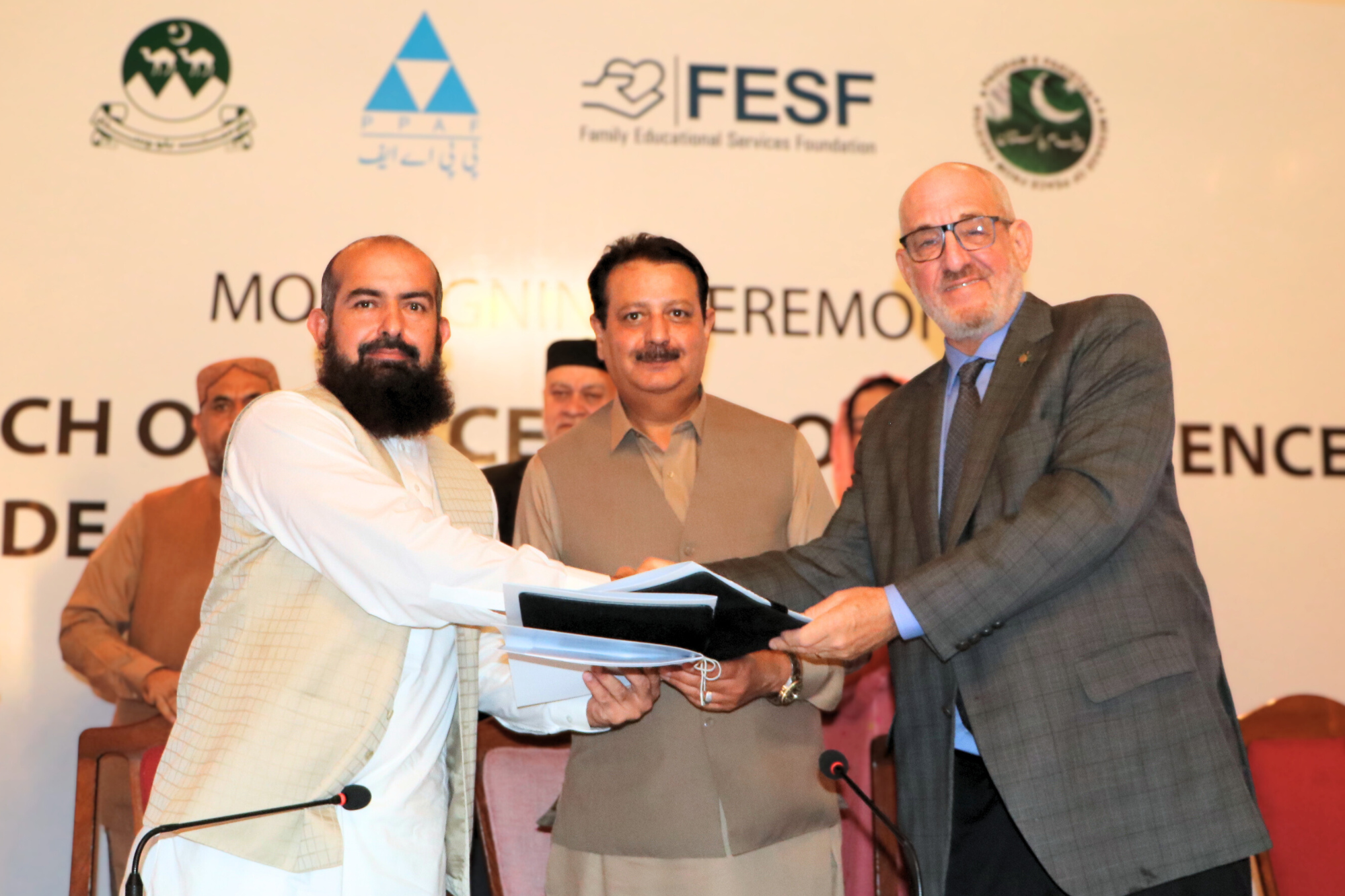Launch of Deaf Reach Centre: PPAF, FESF and Social Welfare Department Join Hands for Inclusive Education
Quetta (August 01 2025)

Quetta, August 01, 2025: In a country where more than one million school-age deaf children, fewer than 5% are enrolled in formal education. The situation in Balochistan is particularly dire that already reports country’s lowest literacy and school enrolment rates, and a near-total absence of infrastructure for deaf education.
To address this challenge, a Memorandum of Understanding (MoU) was signed today between the Pakistan Poverty Alleviation Fund (PPAF), Family Educational Services Foundation (FESF), and the Social Welfare Department, Government of Balochistan, marking the formal launch of the Deaf Reach Centre of Excellence in Quetta. The Centre will be established at the existing Deaf Reach School Quetta, currently operated by the Social Welfare Department and serving 347 deaf students. With funding from PPAF, technical expertise from FESF, and operational support from the Government of Balochistan, the Centre will serve as both a model of best practice and a springboard for future satellite centres across remote districts of the province. Under the MoU, a range of activities will be carried out to strengthen the Centre and ensure its long-term success. These include improving classrooms and learning spaces by providing furniture, IT equipment solar power setup, and setting up a vocational training lab. The plan also includes hiring and training of teachers and staff, offering transport for students and staff, and ensuring regular supplies like books and stationery.
Syed Imran Ahmed Shah, Federal Minister for the Poverty Alleviation and Social Safety (PASS) Division graced the event as Chief Guest. He acknowledged the collective efforts of all partners in building a more inclusive society and promoting education as a pathway to poverty alleviation. Speaking at the ceremony he said, “Today marks the beginning of a new era, a vision that has now turned into reality. I deeply feel for these children and recognise education as a powerful tool for breaking the cycle. I truly appreciate the commitment and compassion behind this initiative. This Centre represents our commitment to leaving no child behind and ensuring that inclusive education becomes a reality for all”.
The ceremony also saw participation from Mr. Wali Muhammad Noorzai, Parliamentary Secretary for the Social Welfare Department, Government of Balochistan as Guest of Honour who remarked, “I see firsthand the urgency to improve access and equity in education and this Centre is a vital step toward that goal.”
He further talked about how support from federal and provincial government along with civil society and general public can play a vital role in this foundational step ahead. All three organisations involved in this landmark initiative shared their vision in line with the spirit of inclusivity, social upliftment, and institutional commitment. Mr. Nadir Gul Barech, CEO PPAF highlighted the significance of strategic partnerships in addressing systemic exclusion. He remarked “Education is a fundamental right; at PPAF, our mandate is to ensure that development reaches the most vulnerable. Through this partnership, we are building on over two decades of work to mainstream inclusion into our poverty alleviation agenda. From supporting over 39,000 individuals with disabilities to enabling over 1,400 deaf students through strategic partnership with FESF, we are following a rights-based and results-driven approach to uplifting every child, regardless of ability. The launch of this Centre of Excellence in Quett a reflects our deep commitment of enhancing opportunities to learn, grow, and contribute and leaving no one behind”.
He shared different success stories and said that this Centre is not only a transformative space but as a scalable mode. Echoing the importance of collaboration, Mr. Richard Geary, Founder and Director of Programs at FESF, shared the journey and success and emphasised the importance of collaboration and replicability of the Deaf Reach model by saying “Our work at FESF has always been deeply personal and professional. We can understand the barriers and the breakthroughs more closely. This model has proven effective in Sindh, Punjab, and KP, and we are proud to bring the same quality, structure, and hope to Balochistan. With continued support from provincial departments, donor institutions, and civil society, we can ensure no deaf child in Balochistan is denied a future. Because together we can achieve more”. Representing the provincial government’s role, Mr. Asmat Ullah Quresh, Secretary of the Social Welfare Department, Government of Balochistan, highlighted challenges and acknowledged the Centre’s po tential to reshape the educational landscape for the deaf community in the province. Talked about the ongoing success and hoping for a better transformation he said, “We urge other partners: development agencies, philanthropists, the private sector and general public to step forward. With our administrative backing and shared commitment, we can do much more for deaf children across Balochistan.”
The event also featured a high-level panel discussion bringing together voices from government, civil society, and the legal and medical communities to explore the current landscape and future potential for inclusion of differently abled people, especially deaf, in Balochistan. Topics discussed included inclusive education, social protection, livelihood opportunities, curriculum gaps, quotas, and the critical need for teacher training. Speakers stressed the importance of multi-sector collaboration, stronger policy enforcement, expanded outreach, and capacity building all essential to ensuring that no individual is left behind. Notable participants included Ms. Kalsoom Niaz Baloch MPA Balochistan, Mr. Jamail, Principal deaf reach center Quetta, Ms. Mahjabeen Duty Director Social Welfare Centre, Mr. Mohammad Tahseen, Chairman PPAF, Mr. Nasir Dotani DG Social Welfare
The launch of the Deaf Reach Centre of Excellence marks a significant milestone in Pakistan’s efforts to promote equitable access to education and empower persons with disabilities, particularly in under-resourced regions like Balochistan.